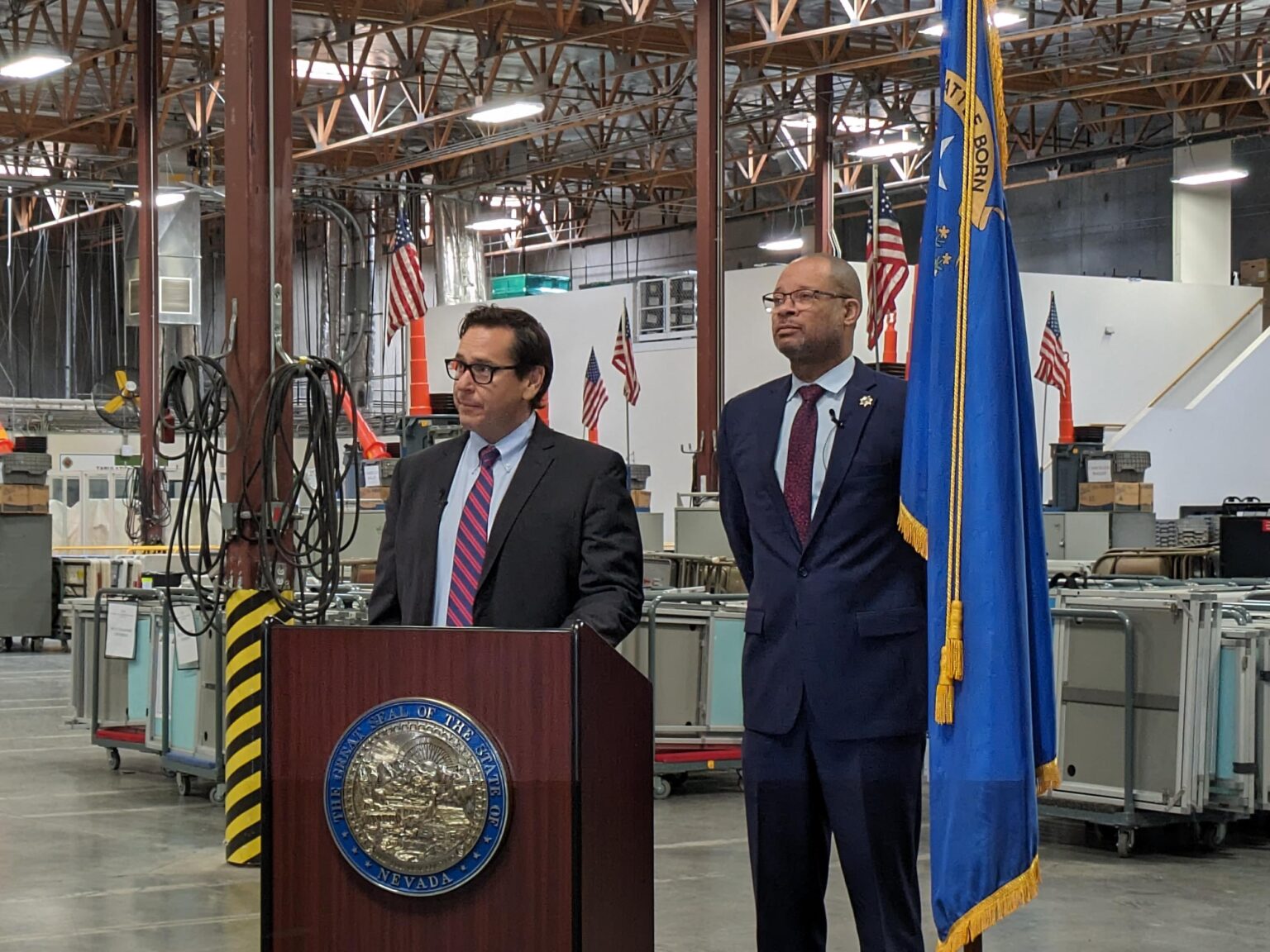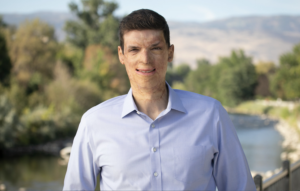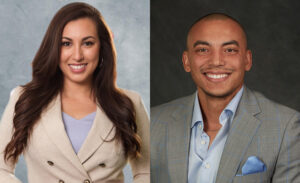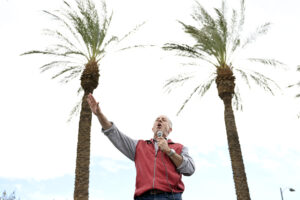5:46
News Story
Top election official tries to get ahead of caucus-caused confusion – without criticizing caucus
Nevada Secretary of State Francisco Aguilar on Wednesday offered little direct criticism of the Nevada Republican Party for rejecting the state-run presidential preference primary in favor of hosting their own party-run caucus. But he defended the state’s primary election system, calling it more accessible to voters than a caucus held over less than three hours on just one specific day.
“There is a conversation that needs to be had at the ‘25 Legislative Session to say: What do we want to do moving forward?” said Aguilar.
That might include a legislative debate on allowing the political parties to determine what system is in the best interest of their members, he added.
The Nevada State Legislature in 2021 passed legislation requiring presidential preference primaries. The legislation was championed and supported by Democrats, who were pushing for the Silver State to become first on the presidential nomination calendar.
The Nevada Republican Party, which opposed the legislation, announced they would hold a presidential caucus despite the 2021 law, and that they would not consider the results of the presidential primary when awarding delegates at the party’s national convention. The state party also forced candidates to choose which to participate in, adopting rules that blocked caucus entry to any candidate who filed for the primary.
Many see the rules as tailormade to benefit former president Donald Trump.
The competing caucus and primary are both less than a month away, and voting advocates are worried people will be confused and become disenfranchised by the process.
“Legally the parties can decide how they pick their nominee,” said Kerry Durmick, Nevada state director at All Voting Is Local. “That’s their choice. My biggest concern is the amount of misinformation because it’s not just impacting their base. It’s now impacting independents, Democrats…”
County administrators this week emphasized that their focus is on election operations. They shied away from discussing the caucus specifically, except to emphasize how county staff and poll workers will direct people asking questions about the Republican caucus to the political party for answers.
Aguilar, the state’s top election official, struck a similar tone during a press conference Wednesday on election integrity and security.
“We really relied on the party to message its members about the caucus process,” he said. “We are here and we are responsible to run the primary, to make sure (people) understand why we do the primary and the way we do it.”
Both the secretary of state and the counties have attempted to get ahead of potential confusion. The secretary of state sent mailers announcing the presidential primary and explicitly stating that only candidates who filed for the primary would appear on the ballot. Clark and Washoe counties have both included similar language in the information they are directing the public to.
Trump, Ron DeSantis, Vivek Ramaswamy and Ryan Binkley will participate in the Republican caucus, which is happening Thursday, Feb. 8. (Chris Christie filed to compete in the caucus but on Wednesday announced he is dropping out of the race.) Nikki Haley, John Castro, Heath Fulkerson, Donald Kjornes, Hirsh Singh, Mike Pence and Tim Scott are competing in the Republican presidential preference primary, which is happening Tuesday, Feb. 6.
“We really relied on the party to message its members about the caucus process.” – Nevada Secretary of State Francisco Aguilar
Republicans may participate in both the caucus and the primary, assuming they are eligible under the caucus rules passed by the political party, which include a requirement that participants be registered Republicans at least 30 days before the caucus. That deadline has already passed.
By contrast, Nevada allows for same-day voter registration, meaning Nevadans can register all the way up to close of polls on Election Day.
Durmick says she would have liked to see a more robust communication and outreach effort from the Nevada Republican Party to all voters.
“We are hearing a lot of confusion,” she added. “If you’re a voter that doesn’t vote in every election but would like to in this, this is a lot of information. And it’s very technical. That’s where the issue is.”
No evidence of widespread voter fraud
Aguilar on Wednesday said that prior to the 2020 election the secretary of state’s office would receive “perhaps a few dozen” complaints about an election. Now, it receives hundreds.
Most of the perceived election violations are not actually violations.
“There are any number of reasons this can happen — from a lack of understanding of the law, to an attempt to overwhelm our office with unfounded allegations,” said Aguilar. “Regardless, we will investigate each report to the best of our ability to make sure that our elections are secure.”
During the 2022 election cycle, nearly 700 election integrity violation reports were filed, according to Aguilar’s office. Most — 587 — were found to involve no potential violations.
Concerns related to election observations accounted for 310 of the reports filed. This included reports of observers being turned away for valid reasons, such as the designated observation area already being at capacity.
Of the reports filed in the 2022 election cycle:
- 165 related to ballots, such as someone reporting delivery to the wrong place when the actual issue was that the voter’s registration was outdated and included a former address.
- 90 related to candidates, such as something related to fiscal reports.
- 50 related to voter registration or list maintenance, which included voters being confused about why their ballot was listed as a provisional ballot.
Aguilar said his office plans to release data related to elections investigations on a quarterly basis, though he cautioned that specific details would not be included in those reports. The office has added dedicated criminal and civil investigators to look into possible election integrity violations.
Since 2020, 14 cases have been referred from the secretary of state’s office to the attorney general for possible prosecution.
“Any allegation of voter fraud is one that my office takes very seriously,” said Attorney General Aaron Ford. “If you have evidence of voter fraud, of someone voting twice, or of similar allegations, I urge you to file a complaint with the secretary of state or with my office, and do it post haste. We will investigate and if the allegations have merit, we will prosecute.”
Ford pointed to the case of Donald Kirk Hartle, who last year was prosecuted for casting his dead wife’s mail ballot. Ford called the case “especially egregious” because Hartle had publicly claimed his dead wife’s ballot had been stolen and Republicans pointed to it as proof of widespread voter fraud.
Ford said voters should look out for voter intimidation, which is a crime.
Aguilar echoed that sentiment.
“This election season will draw some strong emotions as people debate which candidate to support, or disagreements about policy issues,” said Aguilar. “Some people may even want to argue about the best way to cast a ballot. But disagreements are no excuse to bring violence or harassment into the electoral process.”
Our stories may be republished online or in print under Creative Commons license CC BY-NC-ND 4.0. We ask that you edit only for style or to shorten, provide proper attribution and link to our website. AP and Getty images may not be republished. Please see our republishing guidelines for use of any other photos and graphics.




